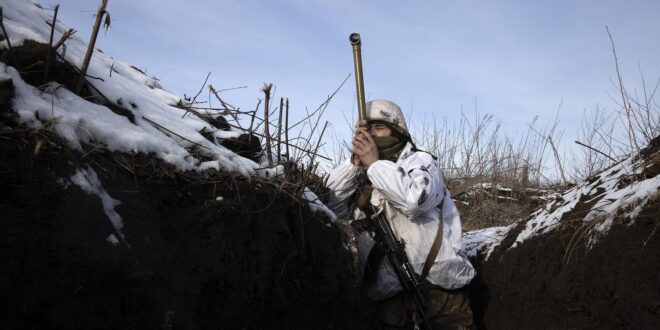NATO unity and diplomacy are the hopes for preventing a wider Russian invasion.
The risk of a new Russian invasion of Ukraine remains high after today’s meeting in Geneva between Secretary of State Antony Blinken and Russian Foreign Minister Sergei Lavrov. The United States delivered its warning, with European allies, of what Blinken called a “swift, severe and a united response” if the Russian troops massed at Ukraine’s border should attack. But the outcome offered at least a hope of avoiding war as Blinken agreed to offer a set of “written comments” to Russia next week on its demand for “security guarantees” that include barring Ukraine from ever joining NATO — a demand that Ukraine, NATO and the United States reject.
Indeed, this has been a week in which NATO is showing unity over the crisis both diplomatically and militarily. The day before meeting Lavrov, Blinken met diplomats from Britain, France and Germany and emphasized that “the United States and our allies will continue to stand with Ukraine” in a determined resistance to any expanded Russian attack. That meeting’s host, German Foreign Minister Annalena Baerbock, stated Europe’s “unequivocal unanimous commitment” to that stance.
The actions of NATO allies are speaking clearly as well. Hours before the Blinken-Lavrov meeting, Spain announced it is sending warships to join NATO forces in the Mediterranean and the Black Sea. Denmark is sending a frigate and four fighter jets as part of NATO’s defenses in the Baltic region. France has offered to send troops to Romania and the United Kingdom has announced it is helping Ukraine with defensive weapons and additional training. As analysts have noted, a surely unintended consequence of Russian President Vladimir Putin’s threat to Ukraine has been its triggering of an exercise in NATO political and defense mobilization.
Why Putin’s Behavior Matters
Preventing a renewed Russian assault on Ukraine is a protection not simply of Ukraine or Europe, but ultimately of U.S. national security, global stability, democracy and international rule of law. That is because the course of this conflict—whether Putin succeeds in using threats and violence to bludgeon other states into submission to his will—could reset globally the 21st-century terms of engagement between democratic and authoritarian systems of governance.
To understand the wider importance of how the world responds, it may help to note that, effectively, Putin is writing a playbook—perhaps the playbook—for authoritarianism and destabilization in the 21st century. He is using Ukraine as arguably the biggest testing ground for his mix of military assault, proxy warfare, cyberattacks, political subversion of other nations, massive social and mass media disinformation, the weaponization of corruption and other creative tactics.
This is a cancer now metastasizing in at least two dangerous ways. One is that Putin is applying any success he achieves in Ukraine to new conflict zones—from Georgia and the Caucasus to Libya, Syria and the Middle East, to countries in Africa and the Americas—where he seeks advantage. A second is that every other authoritarian elite in the world—from China to Venezuela to Zimbabwe—will be encouraged to follow his example.
Even when the United States faces conflicts heavy with menace—as we and our allies do now over Ukraine—true statecraft requires that we simultaneously offer opponents the chance to step back and look for ways to establish what President John Kennedy, in the depths of the Cold War, called “a beachhead of cooperation.” He addressed that offer to the same Kremlin from which Putin rules now, suggesting, “Let us never negotiate out of fear—but let us never fear to negotiate.”
In today’s talks in Geneva, the United States has restated that offer. It is now up to Mr. Putin to determine his response.
 Eurasia Press & News
Eurasia Press & News




